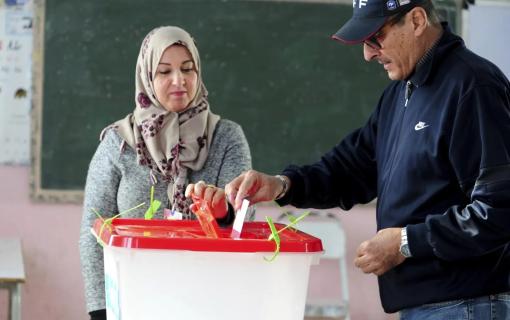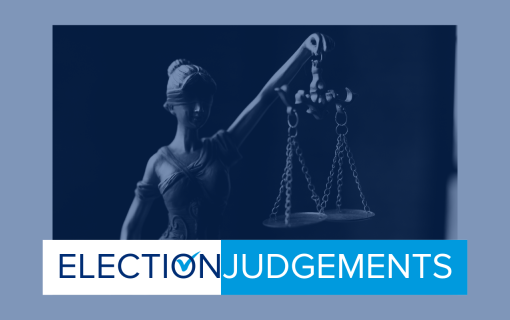Pride and Joy: Libya’s First Post-Gaddafi Election
On July 7, 2012, Libya held the first election since the end of Mu'amar Gaddafi’s 42-year rule. Despite the short time frame to organize the polls and the looming threat to election security, Election Day was jubilant.
Ian Smith, IFES chief of party in Libya, answers some questions on the historic election.
How was the mood on Election Day?
From the beginning of Election Day, the mood was festive. The streets of Tripoli had little traffic because it was a national holiday. Cars that were on the road were honking and waving Libyan flags.
The defining emotion for the day was pride. The first staff to come to the media center at 8:30 a.m. had already voted; they showed off their inked fingers. Pride was evident in the face of every poll worker and every parent that brought their child to the polling station with them. The militia and security officers securing the polling stations were smiling and joking, shaking hands and enjoying the day. Many voters were crying tears of joy after casting their ballots. It was truly a national celebration.
How was security on Election Day?
There had been incidents across the country in the days prior to the election. In the southern town of Kufra, general insecurity and opposition to the elections delayed training of polling staff and undoubtedly negatively affected voter turnout. In the eastern part of the country, groups in favor of greater autonomy for the east or a federal model for the country, such as the Council of Cyrenaica, opposed the elections through protests by threats of a boycott and attacks on HNEC offices in Benghazi and Tobruk. The day before the election there was an attack on a helicopter delivering election supplies that resulted in the death of an HNEC official and crash landing of the helicopter.
In the last HNEC press conference before Election Day, there were many questions about security preparations. While there may have been some nervousness about security in the morning, it quickly faded away as reports came in that more than 94 percent of the polling centers had opened on time.
In Ajdabiya (North East Libya), polling centers were closed for a few hours because of an attack on a polling center in the early hours of Election Day that resulted in the death of one of the attackers. By the end of the day, 1,530 out of 1,554 polling centers had opened (98.5 percent of all centers).
Around Tripoli, there was a lot of security at polling centers with local police and neighborhood militias working together and greeting voters at their arrival at voting centers. Military helicopters were seen flying overhead and armed soldiers were posted at intersections and across from the High National Election Commission (HNEC) Media Center. No one seemed bothered by the security measures; it was really a very relaxed and joyous affair with families going together to vote together.
How was turnout?
Starting at 8:00 a.m. there were lines of early voters. Voting continued and was steady all day. A very small sample of polling stations in Tripoli projected a turnout of about 75 percent.
By close of polling, turnout estimates across the country was at 60 percent, but this did not include all polling stations.
When can results be expected?
Results will be announced in stages as follows:
- Preliminary results per polling station will be posted immediately after the completion of counting and reconciliation. Many stations will complete counting shortly after midnight on election night. Copies of results sheets will be distributed to the manager of polling stations and district offices of the HNEC in tamper evident bags. After conducting intake and checking all sensitive polling materials, original copies of the results forms for each sub-constituency will be sent to the HNEC Tally Center in Tripoli for data entry late on July 8.
- Partial preliminary results per sub-constituency will be announced at the media center upon completed entry of 75 percent of the polling stations. The first such results are expected late July 9.
- Complete preliminary results for a sub constituency will be reported when data from 100 percent of the polling stations has been entered. At this point, results are subject to challenges and appeals in the courts.
- Final results will be announced after all complaints and appeals are adjudicated, no later than 10 days after the announcement of the complete preliminary results for a given sub-constituency.
What are some of the challenges that the election management body has faced when trying to organize elections in a country that has just emerged from a war?
There were many challenges faced by the HNEC. The biggest challenge was the strict timeline laid out in the Constitutional Declaration. The HNEC was formed less than five months before Election Day and expected to conduct a credible election for a population that had not had an election in almost 50 years and had no democratic traditions or voter registry.
In this short time frame, the HNEC had to create its own administrative and field structure, draft a legal framework, register the entire eligible population of Libya and work with a variety of stakeholders including the media, candidates, political entities and voters who had little understanding of the voting process.
The short timeframe was compounded by the limited coordination between other government agencies and ministries – including security, the Ministry of Interior and Ministry of Culture – and civil society and the judiciary.
Security itself was a tremendous challenge, as no single body was able to secure the elections alone. Instead, the HNEC and the Ministry of Interior had to interact and plan with police, military and various militia groups. The post-conflict nature of Libya meant there were more opportunities for opponents of the electoral process to attack polling centers, election warehouses and HNEC staff.
For a first election, the drafters of the election law chose a very complex election law that combined three different voting systems and two different ballots, one for candidates and one for political entities. Additionally, approval was given to allow out-of-country voting in six countries, which had to be organized very quickly. The complexity of the electoral system delayed the production of voter education materials and made it very difficult for voters to understand who and what they were voting for.
Despite all of these challenges, the HNEC was able to organize credible and successful elections that were relatively peaceful, given the tense pre-election environment and general lack of rule of law.
The elections were delayed by two and a half weeks. How did this added time help preparations for the elections?
This additional time was critical to the success of the elections, as it allowed for the design, printing and delivery of ballots and results forms. The delay also gave enough time for a campaign period to take place after the lengthy vetting and approval of candidates by the High Commission for the Implementation of the Integrity and Patriotism Standard, a government body created on April 4 by NTC Regulation No. 26., mandated to vet senior officials and candidates.
The extra time was a huge factor in the success of these elections.
When will the General National Congress (GNC) begin its tenure?
The GNC will begin its tenure as soon as it meets as a body for the first time. This can happen any time after the final certification of results, which will occur no later than 10 days after the announcement of preliminary results by the HNEC.
The interim National Transitional Council (NTC) will be legally dissolved at the first session of the newly elected General National Congress (GNC). All NTC competencies will devolve to the GNC. The president of the GNC and two deputies will be elected by secret ballot during the first session.
What are some of the responsibilities that it will have?
The GNC will become the new legislature for the country. It will appoint a prime minister who will propose names for members of the Cabinet. The GNC will also select a statutory body of 60 non-members to draft a new constitution for Libya, to be adopted by two thirds of GNC before being submitted to a national referendum.
The Constitution is to be drafted and adopted within a period not to exceed 120 days from the GNC first meeting. The draft Constitution will be submitted to a referendum within 30 days from the date of adoption.
The GNC will also be responsible for drafting a new election law, appointing a new electoral management body and preparing for general elections.









